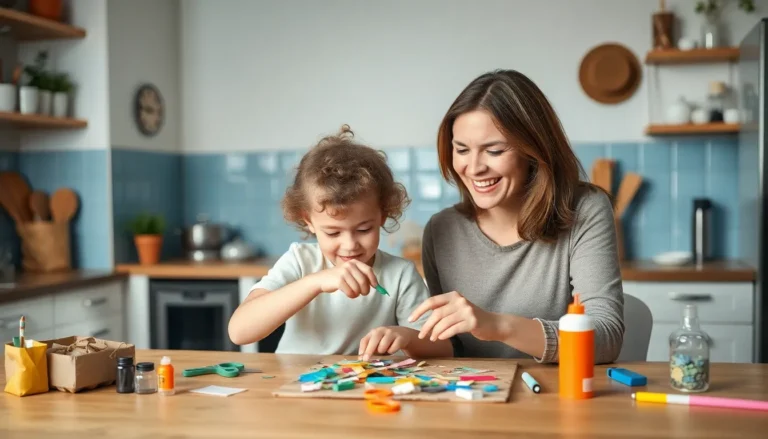In the bustling world of early childhood education, finding the right preschool and learning center can feel like searching for a needle in a haystack. Parents want a place where their little ones can explore, learn, and maybe even make a mess or two—because let’s face it, that’s part of the fun! A quality preschool isn’t just a daycare; it’s a launchpad for lifelong learning, creativity, and social skills.
Table of Contents
ToggleOverview Of Early Childhood Preschool And Learning Centers
Early childhood preschool and learning centers play a vital role in a child’s development. These facilities focus on holistic growth, fostering cognitive, emotional, and social skills. Curriculums often include activities that promote creativity, language acquisition, and problem-solving abilities.
Children aged 2 to 5 benefit significantly from a structured environment, which stimulates learning through play. Interaction with peers aids in developing communication skills and building friendships. Additionally, educators implement age-appropriate learning techniques while encouraging exploration and curiosity.
Parental involvement enhances the preschool experience. Engaging with educators allows parents to stay informed about their child’s progress. Regular communication also helps address any concerns regarding developmental milestones.
Quality centers maintain trained professionals who ensure a safe and nurturing atmosphere. Staff members create individualized learning plans that cater to each child’s unique needs. Observing child-friendly practices, such as hands-on activities and thematic learning, promotes active participation.
Programs aim to encourage independence, as children learn to make choices and manage their time. Incorporating outdoor play and physical activities fosters health and wellness. Exploration of nature and the surrounding environment enriches the learning experience.
Choosing a suitable preschool can guide children towards a successful educational journey. With countless options available, parents must prioritize finding institutions that align with their values and educational philosophies. The emphasis on early childhood education serves as a foundation for lifelong learning and future academic success.
Importance Of Early Childhood Education
Early childhood education plays a crucial role in shaping a child’s future. It lays the groundwork for cognitive growth, emotional security, and social interaction.
Developmental Benefits
Cognitive development flourishes in early childhood programs. Activities stimulate critical thinking, problem-solving, and creativity. Language skills expand as children engage in storytelling and interactive play. Emotional growth occurs as children learn to recognize and express feelings. Structured environments provide routine, helping children to develop self-discipline. Through these experiences, children aged 2 to 5 gain the foundational skills necessary for future academic success.
Social Skills Enhancement
Social skills blossom when children interact with peers. Collaborative activities teach teamwork and cooperation. Children learn to share, negotiate, and resolve conflicts. Communication skills improve through conversations and group play. Friendship-building occurs naturally as children bond over shared experiences. Parental involvement supports this process by keeping parents informed about their child’s development. Children equipped with strong social skills often navigate future educational and social landscapes more confidently.
Types Of Early Childhood Programs
Early childhood programs encompass various educational philosophies, each offering unique benefits for young learners. Parents can explore multiple options to find the right fit for their children.
Montessori Method
The Montessori Method emphasizes self-directed learning and hands-on experiences. Teachers guide children as they engage with materials designed specifically for developmental readiness. This approach fosters independence and encourages exploration at each child’s own pace. Activities often include practical life skills, sensory activities, and creative arts. Children benefit from mixed-age classrooms, which promote peer learning and collaboration. The curriculum encourages critical thinking and fosters a love for learning.
Reggio Emilia Approach
The Reggio Emilia Approach centers around community and collaboration in learning environments. This method views children as capable and resourceful individuals. Educators design experiences based on children’s interests, promoting inquiry and exploration. Art plays a significant role, as children express their thoughts and feelings through creative mediums. Reflection and documentation of learning processes enhance understanding and communication. This approach cultivates relationships among children, families, and teachers.
Traditional Preschool
Traditional preschool programs usually implement structured lesson plans and standardized curricula. Focus typically includes basic academics, social skills, and routine building. Teachers guide large or small group activities that emphasize foundational skills such as numbers, letters, and shapes. Daily schedules often integrate circle time, art projects, and outdoor play. Teacher-led instruction ensures that children are well-prepared for future educational environments. Social interactions in traditional preschools support cooperation, sharing, and conflict resolution.
Choosing The Right Early Childhood Preschool And Learning Center
Selecting an early childhood preschool and learning center involves careful consideration of various factors. Decision-making relies on identifying environments that foster development and align with family values.
Key Factors To Consider
Quality education enhances cognitive, emotional, and social development. Research the curriculum and ensure it emphasizes play-based learning. Look for programs that promote creativity, independence, and problem-solving. Staff qualifications matter; trained professionals should create individualized learning plans. Safety and nurturing environments help children thrive. Outdoor play opportunities enrich experiences while helping children connect with nature. Consider the center’s hours and location for convenience. Additionally, peer interaction plays a crucial role in building social skills, so programs should facilitate collaborative activities.
Questions To Ask
When visiting potential centers, several questions arise that parents should consider. Inquire about teacher-to-child ratios for personalized attention. Ask about curriculum details, including the balance between structured activities and free play. Investigate how the center supports emotional development and handles conflicts among peers. Find out about parental involvement opportunities and how the center communicates progress. Clarifying these aspects helps parents make informed choices that align with their child’s needs. Explore whether the program values community involvement, which can enhance the overall experience for children and families alike.
Selecting the right preschool and learning center is a pivotal decision for parents. It’s not just about childcare; it’s about laying a strong foundation for a child’s future. Quality early childhood education nurtures essential skills that go beyond academics, fostering creativity, emotional intelligence, and social interaction.
By choosing a program that aligns with their values and educational philosophies, parents can ensure their children thrive in a supportive environment. Engaging with trained professionals and participating in the learning journey enhances the overall experience. Ultimately, investing time in this choice can lead to a brighter and more successful path for every child.








